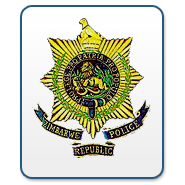
Zimbabwe Republic Police
Forensic Science Directorate: the criminal forensics within the Zimbabwe Republic Police (ZRP) is still in its infancy stages, established and launched in August 2020 from the Civilian scientists who now report at the Ministry of Home Affairs. It was structured benchmarking similar setup in FBI (U.S., established 1910), UK, SAPS, Canadian Mounted Police, Australia, and Europe (especially databases). Currently, police scientists are majoring in the 3 areas of forensic science that is crime scene management, laboratory analysis, and court attending as expert witnesses. The laboratory currently concentrates on material resources and capacity building of its scientists, and has highly trained, internationally accredited police forensic scientists. The experts were trained and are furthering their studies up to PHD in the UK, Russia, India, South Africa, Namibia, and Zimbabwe University to mention but a few. ZRP Crime Lab Units have the following departments: Physical Science Unit [Chemistry, Engineering]; Toxicology; Biology (Anthropology, Entomology etc.); Question Document Examination; and Ballistics (Firearms, Explosives].
www.zrp.gov.zw